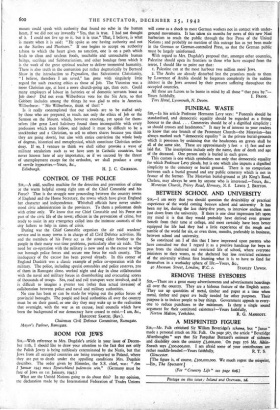RELIGION IN THE SCHOOLS
SIR,—Lorld David Cecil ',aid others affirm, with a confidence which I wish I could at least understand, that the acceptance of what are called Christian ethics, a very exacting code, depends on the holding of a conception of the universe and man's place in it taught us by Christ and transmitted to the Christian Church. How it is then that the essen- tials of so-called Christian ethics have been known and accepted by many who knew nothing of Christ or the Christian Church?
Let me cite some extracts from the ethical confession of one such : " I made a covenant with mine eyes ; how then should I look upon a maid? For what is the portion of God from above? ... Is it not calamity to the unrighteous, and disaster to the workers of iniquity? Doth he not see my ways, and number all my steps? .. . If mine heart have been enticed unto a woman, and I have laid wait at my neighbour's door: then let my wife grind unto another, and let others bow down upon her; For that were an heinous crime . . . for it is a fire that consumeth unto destruction, and would root out all none increase. If I did despise the cause of my .manservant or of my maidservant when they con- tended, what then shall I do when God rseth up? .. . Did not He that made me in the womb make him? .. . It I have withheld the poor from their desire, or have caused the eyes of the widow to fail; or have eaten my morsel alone. . . If I have seen any perish for want of clothing, or that the needy had want of covering. . . . If I lifted up my hand against the fatherless because I saw my help in the gate: then let my shoulder fall from the shoulder-blade. . . . For calamity from God was a terror to me and by reason of His excellency I could do nothing. If I have made gold my hope.... If I rejoiced at the destruction of him that hated me, or lifted up myself when evil found him (yea I suffered not my mouth to sin by asking his life with a curse)," and so on.
I give only a few extracts from the thirty-first chapter, omitting the earlier self-justification. Does the morality set forth here differ .very essentially from that of the Sermon on the Mount? Must we, as the Christian Church once taught, regard these virtues in Job as splendid vices? Whence did Job, or the author of the Book of Job, derive these precepts, this sense of what God required of him? I think largely from the human heart, and, as the texts about adUltery suggest, from the experience of life, seeing what are the results of their neglect. I cannot bring myself to believe that a voice from Sinai or any other mount could speak with authority that found no echo in the human heart, if we did not say inwardly " Yes, that is true. I had not thought of it. I could not live up to it, but it is true." That, I believe, is what is meant when it is said: " He spake as one having authority and not as the Scribes and Pharisees." If one begins to accept on authority taboos to which the heart gives no sanction, one is on a path which leads to clean and unclean foods, touchable and untouchable human beings, sacrilege and Sabbatarianism, and other bondage from which it is the work of the great spiritual teacher to deliver tormented humanity. There is also truth in the contention put rather dogmatically by Bernard Shaw in the introduction to Pygmalion, that Salvationist Christianity,
" I believe, therefore I am saved," has gone with singularly little regard for such exacting ethics as those of Job. The Victorian was a more Christian age, at least a more church-going age, than ours. Could many employers of labour in factories or of domestic servants boast as Job does? Did not even Wilberforce vote for the Six Acts, so that Cobbett includes among the things he was glad to miss in America, Wilberforce: "No Wilberforce, think of that! "
Is it really contemplated that our schools are to be staffed only by those who are prepared, to teach, not only the ethics of Job or the Sermon on the Mount, which, however exacting, yet speak for them- selves (the great Lord Salisbury found them incompatible with every profession which men follow, and indeed it must be difficult to be a stockbroker and a Christian, to sell to others shares because you think they are going down), but also with entire conviction the whole body of dogmas, historical and metaphysical, which constitute Christian ortho- doxy. If so, I venture to think we shall either provoke a wave of militant secularism such as we have seen in Catholic countries, but never known here of any importance, or if we succeed by the threat of unemployment except for the orthodox, we shall produce a crop of servile hypocrites.—Yours, &c.,



























 Previous page
Previous page